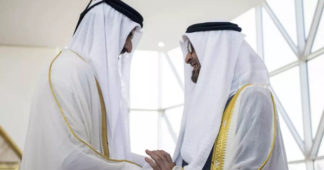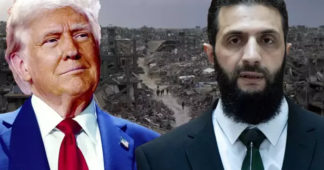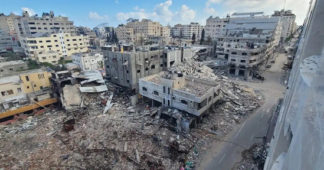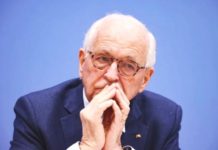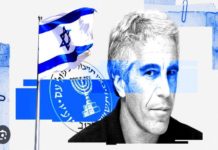During the trip, the rulers of the Gulf countries signed multi-trillion-dollar deals with Trump and conspicuously failed to demand an end to Israel’s genocidal aggression on Gaza.
by Aseel Saleh
May 17, 2025
All eyes were on US President Donald Trump last week during his tour of the Gulf Arab states, with many hoping that his trip would speed up Gaza ceasefire talks and bring a permanent truce in the war-torn enclave. While the ceasefire is still out of reach, the trip proved to be one of Trump’s most lucrative business journeys ever.
Trump’s first major overseas trip in his second presidential term started on Tuesday, May 13 and ended on Friday, May 16, during which he visited three Gulf oil-producing countries, Saudi Arabia, Qatar, and the United Arab Emirates (UAE).
Dr. Saeed Dhiyab the General-Secretary of the Jordanian Democratic Popular Unity Party (Wihda Party) criticized the heads of the Gulf Arab countries, who hosted Trump, noting “they did not succeed in doing the minimum to meet the national interests of Arab people,” during his visit.
Economic relations between the three countries and the Trump administration were the primary focus of the trip, after which Trump claimed that he secured tech, business and military deals that amounted to USD 10 trillion.
“There has been a conspicuous absence of any discussion about the criminal war that has been waged by Israel against our people in the besieged Gaza strip, and in the West Bank,” Dr. Saeed told Peoples Dispatch regarding Trump’s tour.
The Jordanian partisan leader indicated that the tour refuted the claims of those Arab rulers, who “pretend to be concerned about the Palestinian cause,” as they relinquished all opportunities to demand Trump exert pressure on Israel to end the genocide in Gaza.
The Gulf deals
Saudi Arabia
The White House said that Saudi Arabia vowed to invest USD 600 billion in the United States, which will strengthen the nation’s “energy security, defense industry, technology leadership, and access to global infrastructure and critical minerals.” Saudi Arabia also signed an agreement to purchase a USD 142 billion arms package from the US.
Qatar
During a speech to US troops at the Al-Udeid Air Base southwest of the Qatari capital Doha on Wednesday, May 14, Trump announced that Qatar signed a USD 42 billion defense deal with the US, which includes the procurement of the US-made Terminal High Altitude Area Defense (THAAD) system.
Moreover, the US president said that Qatar will also invest USD 10 billion in the coming years to support Al-Udeid, which is the largest US military base in the West Asia region, hosting about 10,000 troops.
President Trump visits U.S. troops at Al Udeid Air Base in Qatar. 🇺🇸
God bless our troops! 🇺🇸 pic.twitter.com/RNnXcizu7c
— The White House (@WhiteHouse) May 15, 2025
Qatar signed another deal with the American manufacturing giant Boeing to purchase up to 210 widebody jets. The deal is considered “ the largest aircraft and engine order” in the history of the country’s flag carrier, Qatar Airways.
UAE
Meanwhile, UAE revealed its intention to invest USD 1.4 trillion in the United States in different sectors including technology, artificial intelligence and energy over the next decade.
The UAE also sealed a USD 200 billion deal with the US that includes a USD 14.5 billion agreement between Boeing, American aircraft engine supplier GE Aerospace, and UAE’s national airline Etihad Airways.
Diplomatic efforts
Although Trump’s attention during his trip was largely directed towards wealth accumulation, there was still room for touching on foreign policy and some diplomatic hotspots.
Trump lifts US sanctions on Syria
On the first day of his Gulf tour, Trump announced from the Saudi capital Riyadh that the US will lift all sanctions on Syria.
“I will be ordering the cessation of sanctions against Syria in order to give them a chance at greatness,” the US president stated.
“In Syria, which has seen so much misery and death, there is a new government that will hopefully succeed in stabilizing the country and keeping peace. That’s what we want to see,” he asserted.
Nevertheless, lifting the sanctions, which marks the first step for normalization of ties between Washington and Damascus, would not have been decided without a heavy price to be paid not only by Syria but also the region.
One day after the announcement, Trump met with Syria’s interim President Ahmad Al-Sharaa in Riyadh. The White House said that Trump asked Al-Sharaa during the meeting to deport what it described as “Palestinian terrorists” from Syria, join the Abraham Accords with Israel, and “assume responsibility for ISIS detention centers in northeast Syria.”
US-Iran nuclear deal
While in Qatar, the second leg of his Gulf tour, Trump claimed that his administration is very close to sealing a nuclear deal with Iran, although there were still gaps to be bridged in negotiations between the two countries.
“We’re in very serious negotiations with Iran for long-term peace,” Trump said, adding: “We’re not going to be making any nuclear dust in Iran. I think we’re getting close to maybe doing a deal without having to do this.”
.@POTUS: “I want to make a deal with Iran, I want to do something if it’s possible, but for that to happen, it must stop sponsoring terror, halt its bloody proxy wars, and permanently and verifiably cease its pursuit of nuclear weapons… I’m strongly urging all nations to join… pic.twitter.com/WUl2ZLONHe
— Rapid Response 47 (@RapidResponse47) May 14, 2025
Russia – Ukraine war
Trump’s tour in the West Asia region raised speculations, whether he would extend his trip and head to Türkiye, where ceasefire talks between Russia and Ukraine have been underway, after wrapping up his visits in the Gulf. However, the US President decided to travel back to Washington DC.
While officials from Russia, Ukraine and the US were in Istanbul for negotiations, Russian President Vladimir Putin did not show up for a face-to-face meeting with Ukrainian President Volodymyr Zelenskyy, which was supposed to be held in the Turkish capital Istanbul on Thursday, May 15.
Trump’s suggests to turn Gaza into “Freedom Zone”
After Trump’s “Riviera of the Middle East” proposal was rejected by heads of Arab countries, which called for the mass displacement of Palestinians in the Gaza strip to other countries, he brought forward a new proposal during his Gulf trip.
Trump told reporters in Qatar on Thursday, that the besieged enclave should be turned into a US-controlled “freedom zone“, with no further details being given to understand what the term would imply.
“I have concepts for Gaza that I think are very good, make it a freedom zone, let the United States get involved and make it just a freedom zone. Have a real freedom zone, because it seems that Gaza, every time, every 10 years, it happens, and more than that. It really happens all throughout. It never solved the Gaza problem,” Trump stated.
“If it’s necessary, I think I’d be proud to have the United States have it, take it, make it a freedom zone,” he said.
“Let some good things happen. Put people in homes where they can be safe, and Hamas is going to have to be dealt with,” Trump added, without clarifying whether Palestinians will remain in Gaza or be displaced as part of this proposal. His statement also sounds vague when it comes to Hamas, as it does not specify how the Palestinian movement will be “dealt with”.
The US President spoke about his aspirations to take over Gaza, without mentioning the urgency of stopping Israel’s ongoing genocide there. The heads of the Arab states, who hosted him, did not raise the issue for discussion either.
During Trump’s Gulf tour, Israel escalated its massacres across the Gaza strip, dropping bunker buster bombs on hospitals and killing more than 300 in a span of a few days. These actions sharply contrasted with the expectations that Trump’s visit to the region would have a positive impact on the progress of the ceasefire talks between Hamas and Israel.
The US has not even exerted pressure on Israel to allow humanitarian aid into Gaza, after Hamas had released US-Israeli captive Edan Alexander prior to Trump’s trip in the region as a goodwill gesture.
Gulf trip depicts Trump as “feudal lord” not “peacemaker”
The Jordanian political leader Dr. Saeed Dhiyab suggests that the trip has laid bare “the falsity of Trump’s claims of being a peacemaker”, because he did not address the need for an immediate ceasefire in Gaza.
“On the contrary, Trump’s success in sealing prodigious arms deals with the visited Gulf Arab countries, paves the way for more wars to be waged in the region,” Dr. Saeed warned.
The General-Secretary of Wihda Party described Trump’s tour as an explicit act of feudalism, during which the US president came to collect levies from the rulers of the three Gulf countries, who are willing to pay him to preserve their thrones.
“What happened during the trip demonstrated the nature of the relationship between Trump and these rulers. It is a relationship between a lord and his serfs. As the regimes, which these rulers lead lack legitimacy, they seek alliance with the US administration and even with Israel to protect them from their own people. This explains why these regimes strive to normalize ties with Israel, fulfill the orders of their American lord, and yield to his wishes,” Dr. Saeed stated.
“The amount of money that Trump was able to earn for investment through these deals is insane. If these trillions of dollars granted to him were invested in Arab countries, it would have made a quantum leap for the Arab people. It would have eliminated the sovereign debt in our countries, and all other economic problems,” Dr. Saeed concluded.
We remind our readers that publication of articles on our site does not mean that we agree with what is written. Our policy is to publish anything which we consider of interest, so as to assist our readers in forming their opinions. Sometimes we even publish articles with which we totally disagree, since we believe it is important for our readers to be informed on as wide a spectrum of views as possible.


